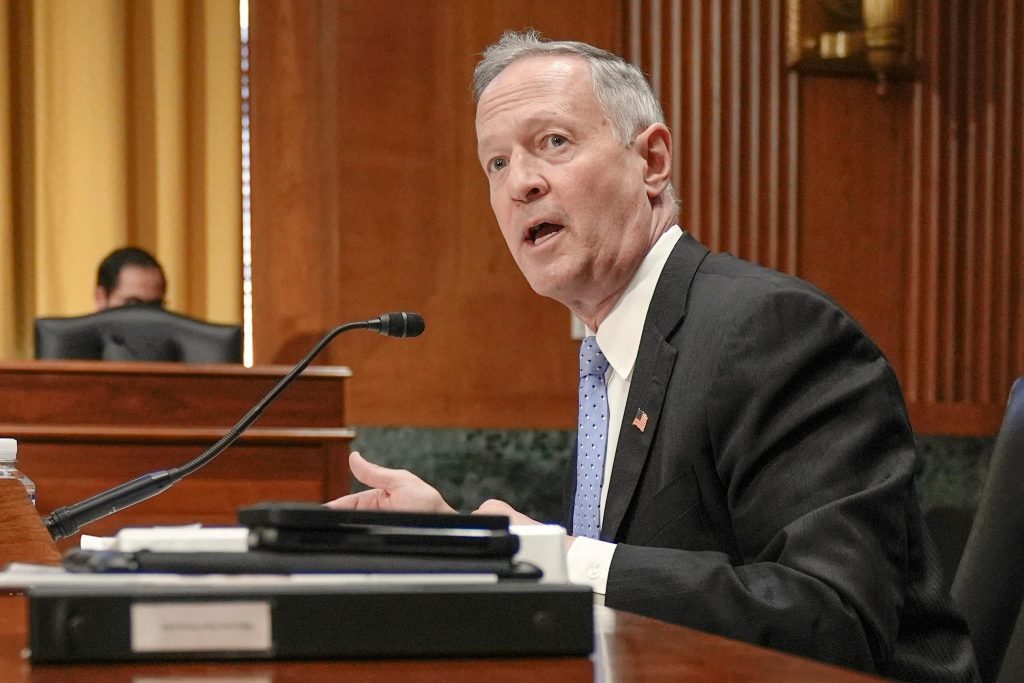By FATIMA HUSSEIN and TOM MURPHY (Associated Press)
WASHINGTON (AP) — The depletion dates for Medicare and Social Security have been delayed due to changes in the projected depletion dates, with the annual Social Security and Medicare trustees report on Monday attributing this to an improving economy.
However, officials warn that policy changes are necessary to prevent the programs from being unable to pay full benefits to retiring Americans.
The latest report has pushed Medicare's hospital insurance trust fund depletion date back five years to 2036, with increased payroll tax income and lower-than-expected expenses contributing to this change. Medicare covers people aged 65 and older as well as those with severe disabilities or illnesses, with over 66 million people being covered last year, the majority of whom were 65 and older.
When the fund's reserves are depleted, Medicare would only be able to cover 89% of costs for patients' hospital visits, hospice care, nursing home stays, or home health care following hospital visits.
Meanwhile, the trust funds for Social Security, which cover old age and disability recipients, will be unable to pay full benefits starting in 2035, instead of the previous estimate of 2034. Social Security would only be able to pay 83% of benefits.
Social Security Administration Commissioner Martin O'Malley referred to the report as “a measure of good news,” but stressed that “Congress still needs to act to avoid a 17% cut to people's Social Security benefits, which is now projected in the absence of their action.”
Around 71 million people, including retirees, disabled individuals, and children, receive Social Security benefits.
President Joe Biden responded to the report by stating that “as long as I am president, I will continue to strengthen Social Security and Medicare,” and expressed his desire for high-income taxpayers “to pay their fair share” to enhance funding for the benefit programs.
Lawmakers have long postponed dealing with the financial challenges of Social Security and Medicare. Social Security benefits were last adjusted around 40 years ago, when the federal government raised the eligibility age for the program from 65 to 67. The eligibility age for Medicare has not changed, with individuals becoming eligible for the medical coverage at the age of 65.
Congressional Budget Office report ing has stated that the main contributors to the rising debt in relation to GDP are increasing interest costs and spending on Medicare and Social Security, with an aging population being a driving factor behind these numbers.
The new report predicts that Medicare's income will be higher than last year's, as the number of covered workers and average wages is expected to rise. The report also indicates a likely decrease in expenses, mainly due to a policy change in how Medicare Advantage rates are factored in and lower-than-expected spending on inpatient hospital and home health agency services.
Medicare Advantage plans are a form of the federal program managed by health insurers.
A poll in March 2023 by The Associated Press-NORC Center for Public Affairs Research reveals that the majority of U.S. adults oppose plans to reduce Medicare or Social Security benefits, and most are in favor of increasing taxes on the wealthiest people in the country to maintain the current state of Medicare.
The fate of Social Security and Medicare has become a major topic as President Joe Biden and former Republican President Donald Trump both campaign for reelection this year.
Biden, a Democrat, has promised to reject any attempts by Republicans to decrease Medicare or Social Security benefits to prepare for the deficit. He has suggested raising taxes for individuals earning over $400,000 a year, to support Medicare. However, he has not put forth a plan for Social Security.
In a March interview with CNBC, Trump indicated his willingness to make cuts to Social Security and Medicare, stating that “there is a lot you can do in terms of entitlements, in terms of cutting.”
Nancy Altman, president of Social Security Works, a group advocating for the social insurance program, stated that the report from Monday demonstrates the need for Congress to take action sooner rather than later in order to ensure that Social Security can continue to provide full benefits for future generations.
AARP CEO Jo Ann Jenkins emphasized that “the potential consequences are simply too significant to do nothing.”
Michael A. Peterson, CEO of the Peter G. Peterson Foundation, commented that “the longer Congress postpones reform, the more difficult the options become, and these programs are too crucial to allow them to continue towards insolvency. There are numerous solutions available to strengthen Social Security and Medicare, and it’s imperative that Congress offer greater assurance and stability for the future.”
__
Murphy reported from Indianapolis.









